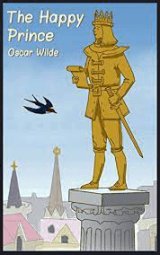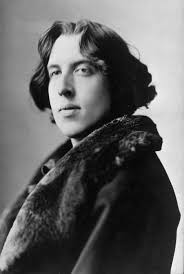The Happy Prince Page #6
The Happy Prince and Other Tales is a collection of stories for children by Oscar Wilde first published in May 1888. It contains five stories: "The Happy Prince", "The Nightingale and the Rose", "The Selfish Giant", "The Devoted Friend", and "The Remarkable Rocket".
the trees were so glad to have the children back again that they had covered themselves with blossoms, and were waving their arms gently above the children’s heads. The birds were flying about and twittering with delight, and the flowers were looking up through the green grass and laughing. It was a lovely scene, only in one corner it was still winter. It was the farthest corner of the garden, and in it was standing a little boy. He was so small that he could not reach up to the branches of the tree, and he was wandering all round it, crying bitterly. The poor tree was still quite covered with frost and snow, and the North Wind was blowing and roaring above it. “Climb up! little boy,” said the Tree, and it bent its branches down as low as it could; but the boy was too tiny. And the Giant’s heart melted as he looked out. “How selfish I have been!” he said; “now I know why the Spring would not come here. I will put that poor little boy on the top of the tree, and then I will knock down the wall, and my garden shall be the children’s playground for ever and ever.” He was really very sorry for what he had done. So he crept downstairs and opened the front door quite softly, and went out into the garden. But when the children saw him they were so frightened that they all ran away, and the garden became winter again. Only the little boy did not run, for his eyes were so full of tears that he did not see the Giant coming. And the Giant stole up behind him and took him gently in his hand, and put him up into the tree. And the tree broke at once into blossom, and the birds came and sang on it, and the little boy stretched out his two arms and flung them round the Giant’s neck, and kissed him. And the other children, when they saw that the Giant was not wicked any longer, came running back, and with them came the Spring. “It is your garden now, little children,” said the Giant, and he took a great axe and knocked down the wall. And when the people were going to market at twelve o’clock they found the Giant playing with the children in the most beautiful garden they had ever seen. All day long they played, and in the evening they came to the Giant to bid him good-bye. “But where is your little companion?” he said: “the boy I put into the tree.” The Giant loved him the best because he had kissed him. “We don’t know,” answered the children; “he has gone away.” “You must tell him to be sure and come here to-morrow,” said the Giant. But the children said that they did not know where he lived, and had never seen him before; and the Giant felt very sad. Every afternoon, when school was over, the children came and played with the Giant. But the little boy whom the Giant loved was never seen again. The Giant was very kind to all the children, yet he longed for his first little friend, and often spoke of him. “How I would like to see him!” he used to say. Years went over, and the Giant grew very old and feeble. He could not play about any more, so he sat in a huge armchair, and watched the children at their games, and admired his garden. “I have many beautiful flowers,” he said; “but the children are the most beautiful flowers of all.” One winter morning he looked out of his window as he was dressing. He did not hate the Winter now, for he knew that it was merely the Spring asleep, and that the flowers were resting. Suddenly he rubbed his eyes in wonder, and looked and looked. It certainly was a marvellous sight. In the farthest corner of the garden was a tree quite covered with lovely white blossoms. Its branches were all golden, and silver fruit hung down from them, and underneath it stood the little boy he had loved. Downstairs ran the Giant in great joy, and out into the garden. He hastened across the grass, and came near to the child. And when he came quite close his face grew red with anger, and he said, “Who hath dared to wound thee?” For on the palms of the child’s hands were the prints of two nails, and the prints of two nails were on the little feet. “Who hath dared to wound thee?” cried the Giant; “tell me, that I may take my big sword and slay him.” “Nay!” answered the child; “but these are the wounds of Love.” “Who art thou?” said the Giant, and a strange awe fell on him, and he knelt before the little child. And the child smiled on the Giant, and said to him, “You let me play once in your garden, to-day you shall come with me to my garden, which is Paradise.” And when the children ran in that afternoon, they found the Giant lying dead under the tree, all covered with white blossoms. [Picture: Decorative graphic of wreath] The Devoted Friend. [Picture: Hans and the Miller] ONE morning the old Water-rat put his head out of his hole. He had bright beady eyes and stiff grey whiskers and his tail was like a long bit of black india-rubber. The little ducks were swimming about in the pond, looking just like a lot of yellow canaries, and their mother, who was pure white with real red legs, was trying to teach them how to stand on their heads in the water. “You will never be in the best society unless you can stand on your heads,” she kept saying to them; and every now and then she showed them how it was done. But the little ducks paid no attention to her. They were so young that they did not know what an advantage it is to be in society at all. “What disobedient children!” cried the old Water-rat; “they really deserve to be drowned.” “Nothing of the kind,” answered the Duck, “every one must make a beginning, and parents cannot be too patient.” “Ah! I know nothing about the feelings of parents,” said the Water-rat; “I am not a family man. In fact, I have never been married, and I never intend to be. Love is all very well in its way, but friendship is much higher. Indeed, I know of nothing in the world that is either nobler or rarer than a devoted friendship.” “And what, pray, is your idea of the duties of a devoted friend?” asked a Green Linnet, who was sitting in a willow-tree hard by, and had overheard the conversation. “Yes, that is just what I want to know,” said the Duck; and she swam away to the end of the pond, and stood upon her head, in order to give her children a good example. “What a silly question!” cried the Water-rat. “I should expect my devoted friend to be devoted to me, of course.” “And what would you do in return?” said the little bird, swinging upon a silver spray, and flapping his tiny wings. “I don’t understand you,” answered the Water-rat. “Let me tell you a story on the subject,” said the Linnet. “Is the story about me?” asked the Water-rat. “If so, I will listen to it, for I am extremely fond of fiction.” “It is applicable to you,” answered the Linnet; and he flew down, and alighting upon the bank, he told the story of The Devoted Friend. “Once upon a time,” said the Linnet, “there was an honest little fellow
Translation
Translate and read this book in other languages:
Select another language:
- - Select -
- 简体中文 (Chinese - Simplified)
- 繁體中文 (Chinese - Traditional)
- Español (Spanish)
- Esperanto (Esperanto)
- 日本語 (Japanese)
- Português (Portuguese)
- Deutsch (German)
- العربية (Arabic)
- Français (French)
- Русский (Russian)
- ಕನ್ನಡ (Kannada)
- 한국어 (Korean)
- עברית (Hebrew)
- Gaeilge (Irish)
- Українська (Ukrainian)
- اردو (Urdu)
- Magyar (Hungarian)
- मानक हिन्दी (Hindi)
- Indonesia (Indonesian)
- Italiano (Italian)
- தமிழ் (Tamil)
- Türkçe (Turkish)
- తెలుగు (Telugu)
- ภาษาไทย (Thai)
- Tiếng Việt (Vietnamese)
- Čeština (Czech)
- Polski (Polish)
- Bahasa Indonesia (Indonesian)
- Românește (Romanian)
- Nederlands (Dutch)
- Ελληνικά (Greek)
- Latinum (Latin)
- Svenska (Swedish)
- Dansk (Danish)
- Suomi (Finnish)
- فارسی (Persian)
- ייִדיש (Yiddish)
- հայերեն (Armenian)
- Norsk (Norwegian)
- English (English)
Citation
Use the citation below to add this book to your bibliography:
Style:MLAChicagoAPA
"The Happy Prince Books." Literature.com. STANDS4 LLC, 2024. Web. 23 Nov. 2024. <https://www.literature.com/book/the_happy_prince_1431>.




Discuss this The Happy Prince book with the community:
Report Comment
We're doing our best to make sure our content is useful, accurate and safe.
If by any chance you spot an inappropriate comment while navigating through our website please use this form to let us know, and we'll take care of it shortly.
Attachment
You need to be logged in to favorite.
Log In